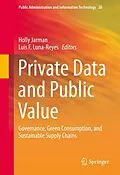This book investigates the ways in which these systems can promote public value by encouraging the disclosure and reuse of privately-held data in ways that support collective values such as environmental sustainability. Supported by funding from the National Science Foundation, the authors' research team has been working on one such system, designed to enhance consumers ability to access information about the sustainability of the products that they buy and the supply chains that produce them. Pulled by rapidly developing technology and pushed by budget cuts, politicians and public managers are attempting to find ways to increase the public value of their actions. Policymakers are increasingly acknowledging the potential that lies in publicly disclosing more of the data that they hold, as well as incentivizing individuals and organizations to access, use, and combine it in new ways. Due to technological advances which include smarter phones, better ways to track objects and people as they travel, and more efficient data processing, it is now possible to build systems which use shared, transparent data in creative ways. The book adds to the current conversation among academics and practitioners about how to promote public value through data disclosure, focusing particularly on the roles that governments, businesses and non-profit actors can play in this process, making it of interest to both scholars and policy-makers.
Zusammenfassung
This book investigates the ways inwhich these systems can promote public value by encouraging the disclosure andreuse of privately-held data in ways that support collective values such asenvironmental sustainability. Supported by funding from the National ScienceFoundation, the authors' research team has been working on one such system,designed to enhance consumers ability to access information about thesustainability of the products that they buy and the supply chains that producethem. Pulled by rapidly developing technology and pushed by budget cuts,politicians and public managers are attempting to find ways to increase thepublic value of their actions. Policymakers are increasingly acknowledging thepotential that lies in publicly disclosing more of the data that they hold, aswell as incentivizing individuals and organizations to access, use, and combineit in new ways. Due to technological advances which include smarterphones, better ways to track objects and people as they travel, and moreefficient data processing, it is now possible to build systems which useshared, transparent data in creative ways. The book adds to thecurrent conversation among academics and practitioners about how to promotepublic value through data disclosure, focusing particularly on the roles thatgovernments, businesses and non-profit actors can play in this process, makingit of interest to both scholars and policy-makers.
Inhalt
Introduction: public value and private organizations.- Collaboration and trust-building among public and private actors.- Labeling, certification, and consumer trust.- Privacy, secrecy, and system security.- Strategies for collaborative governance.- Collaborative standards and hard law.- Long-term goals and power structures groups in the longer term.- Conclusion: Encouraging private sector transparency.
